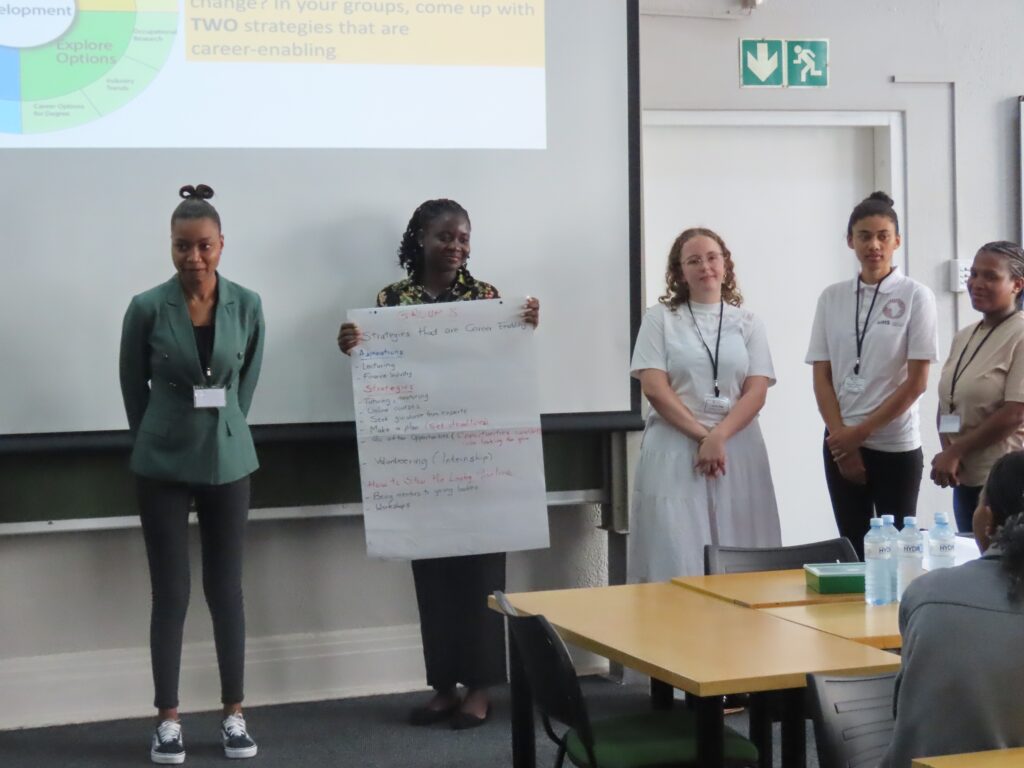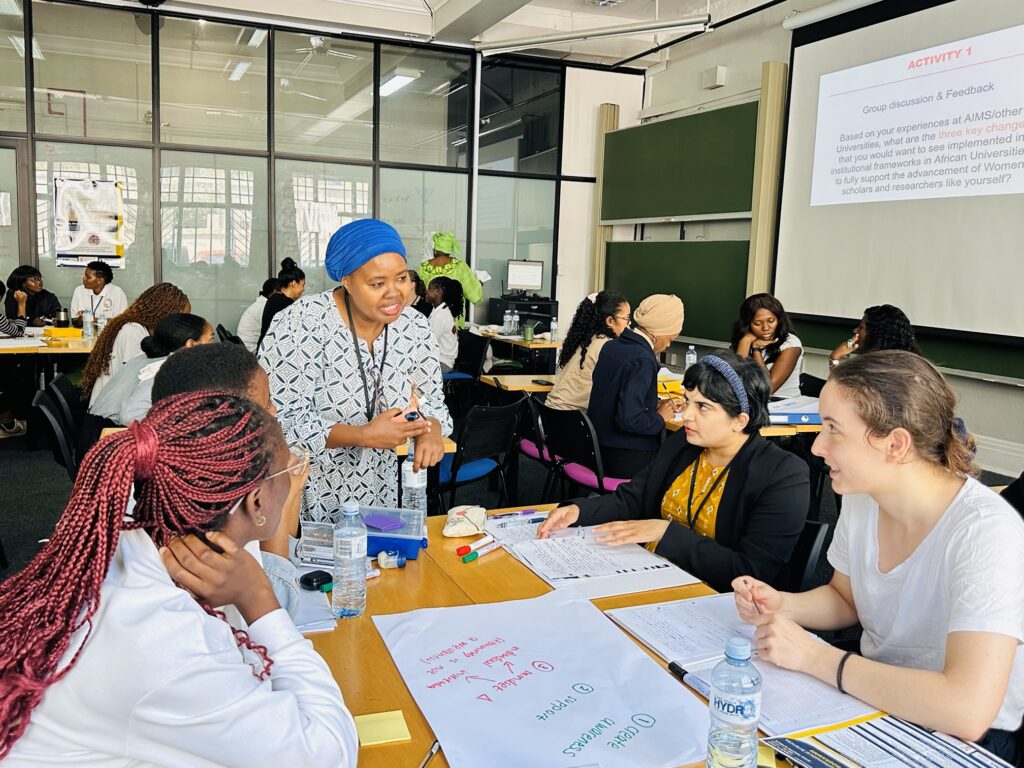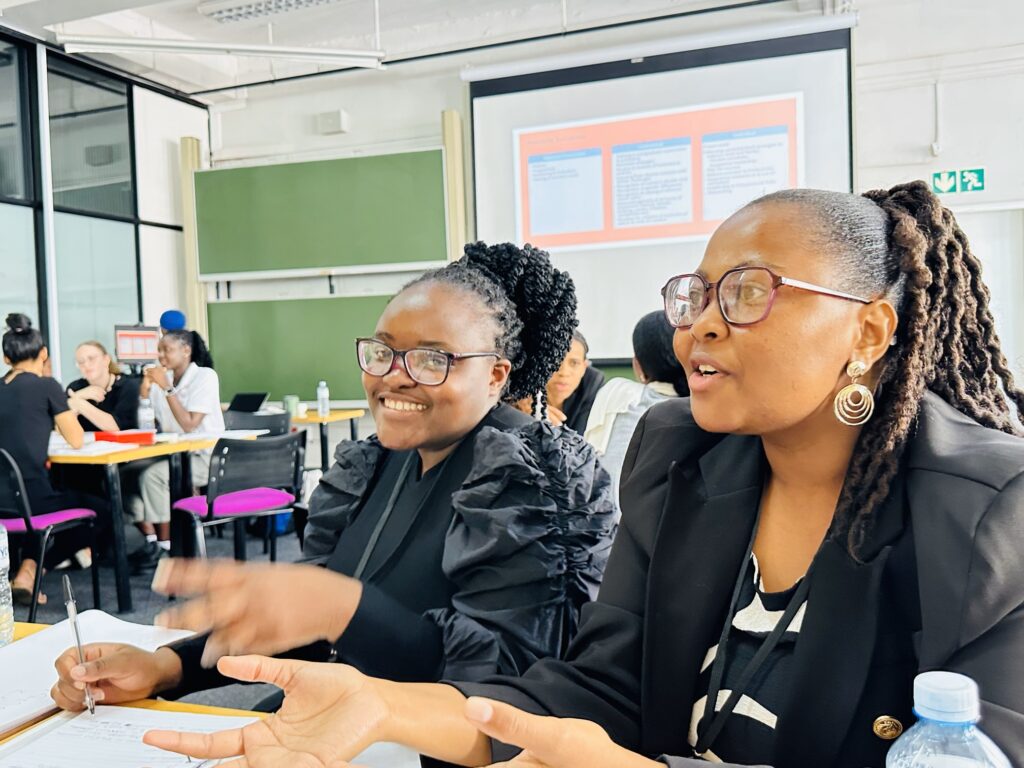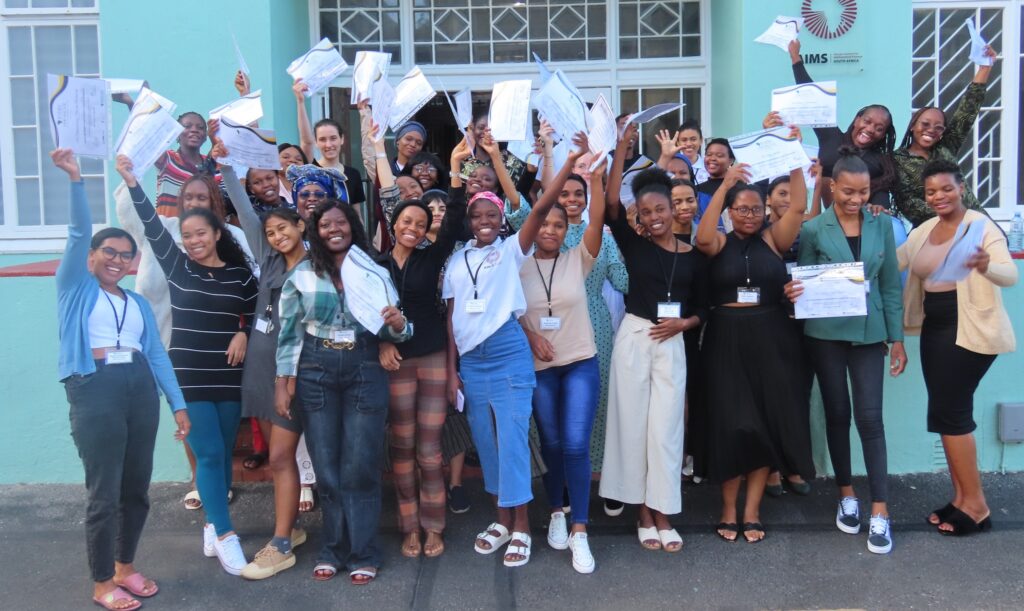From 28 February to 01 March, AIMS South Africa House of Science, in partnership with African Gong, convened a second Women’s Advancement Forum: International Exchanges, Research & Academia (WAFIRA) workshop in South Africa. WAFIRA is a capacity-building programme that is uniquely centred on the contexts, realities, challenges, opportunities and strengths across the landscape of African Women’s indigeneity. WAFIRA is conceptualised to foreground and empower African women as leaders and agents for the advancement of their studies and career progressions across academia, research, and industry.
Since 2014, WAFIRA has been delivered in different African countries, impacting over 1,500 female academics and researchers. In South Africa, the programme was delivered to the first cohort of young women researchers and academics in mathematical sciences at the University of the Western Cape (UWC) in 2023 as a partnership between AIMS, African Gong, and UWC.
Under the theme Advancing African Women in Mathematical Sciences, the workshop brought together 40 young and emerging researchers from AIMS South Africa, the Universities of Cape Town and the Western Cape, and the African Astronomical Society. There were also three WAFIRA alumni from the 2023 cohort, experts in gender equity in STEM, role models, and mentors for a transformative capacity-building experience.
Prof. Ulrich Paquet, Director of AIMS South Africa; Prof. Karin-Therese Howell, Academic Director; Prof. Dephney Mathebula, an Associate Professor of Mathematics in the Department of Decision Sciences at UNISA and the Acting Director of the School of Economic and Financial Sciences at UNISA, Dr Elizabeth Rasekoala, President of the African Gong, and Dr Rejoyce Gavhi-Molefe, AIMS South Africa House of Science Manager, gave Introductory Remarks on the first day of the workshop.
Welcoming the participants, the keynote speaker, Prof. Mathebula, emphasised the importance of the WAFIRA workshop.
“This space is designed to inspire, empower, and challenge us to rethink the role of African institutions in advancing women’s participation in mathematical sciences, academia and research.”
Highlighting the role of mathematics in solving real-world problems, she stressed that African women must take the lead in STEM research and leadership. She addressed the issue of gender disparity in academia, highlighting that only 19% of full professors in South Africa are women. She called for greater representation:
“African women not only belong in STEM but must also lead in shaping academia and research on the continent.”
Prof. Paquet added on the disparities in gender in STEM representation across Africa, citing data from various countries based on experience from Deep Learning Indaba’s IndabaX programme. While some nations like Kenya and Egypt show strong female participation, others still struggle with inclusivity, creating a very powerful rationale for a programme such as WAFIRA. Prof Paquet credited the presence of resilient women leaders who take the initiative and create opportunities:
“The reason why you see such representation in Kenya, even better in places like Egypt, is because there are always strong amazing women leaders who step up, who organize, who self-organize, and who go beyond their comfort zones and just do it.”
Over the two days, participants engaged in hands-on, minds-on, informative, transformative, mindful, and highly interactive programmes facilitated by Dr Rejoyce Gavhi-Molefe and Dr Elizabeth Rasekoala. The programme included sessions on capacity-building, Strategies and Skills development for successful Academic, Research, and Career progression pathways.
During the workshop, the WAFIRA Programme alumni from 2023 shared their experiences and the impact of WAFIRA on their careers. They served as role models. These were Dr Juliet Nagawa, a Postdoctoral Research Fellow at the University of Cape Town; and Ms Jessica Randall and Ms Stephanie Agenbag, MSc Students at the University of the Western Cape. They testified about the transformative impact of the WAFIRA programme on their confidence, career progression, and views as emerging African women scientists.



Workshop Outcomes and Participants’ Testimonials
“WAFIRA is a safe haven for women in science, providing a space to catch a break and be unapologetically yourself. I feel ready to tackle anything. WAFIRA gave me the inspiration I have been thirsting and hungering for.”
“I enjoyed this workshop very much. The speakers and content was really good, a much-needed conversation amongst a keen group. I found motivation! I came here very demotivated and unsure of my next step. But from this WAFIRA workshop, I found hope, motivation and knowing that having the destination/aspriration is the most vital step in knowing the next step.”
“Elephants in the room were addressed and properly (open & non-judgmental) managed, and an open, safe space was created to feel understood, to resonate & be reminded as well as warned to be accountable of yourself – a breath of fresh air from inner thoughts to seeking out a mentor. I need to be aware of my dreams and think about building the rochet to fully reach the moon with my intrinsic and extrinsic enablers.”
“As a woman in postgraduate studies, it’s okay to feel like my culture and institutional values are not fully aligned. This is because, as a woman, I am expected to be raising a family, not busy building my career. My role is to inform and educate my culture while informing my institution to encourage us.”
“I have been enlightened and I have learnt a lot just within these two days. It been very impactful and engaging and I must say I’m very educated in different fields now. Communication skills, presentation skills, leadership skills and research skills.”
“Having to share ideas with other women was nice. I networked with students that I have never spoken with ever since I came to AIMS. I would like to give back to other girls who are like me and start WAFIRA clubs in other campus.”
Ms Zizipo Mbambo and Ms Tabitha Mwikali Mash, structured Master’s students at AIMS South Africa, directed the workshop as part of their leadership training, and Ms Noluthando Sithole assisted with logistics as part of her Internship training. See Tabitha’s testimony on the benefit of WAFIRA. Tabitha’s testimonial

